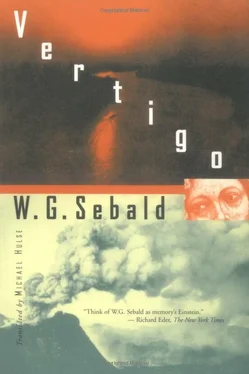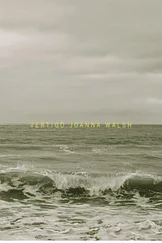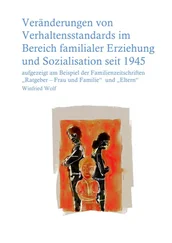Winfried Sebald - Vertigo
Здесь есть возможность читать онлайн «Winfried Sebald - Vertigo» весь текст электронной книги совершенно бесплатно (целиком полную версию без сокращений). В некоторых случаях можно слушать аудио, скачать через торрент в формате fb2 и присутствует краткое содержание. Год выпуска: 2001, ISBN: 2001, Издательство: New Directions, Жанр: Современная проза, на английском языке. Описание произведения, (предисловие) а так же отзывы посетителей доступны на портале библиотеки ЛибКат.
- Название:Vertigo
- Автор:
- Издательство:New Directions
- Жанр:
- Год:2001
- ISBN:978-0811214858
- Рейтинг книги:4 / 5. Голосов: 1
-
Избранное:Добавить в избранное
- Отзывы:
-
Ваша оценка:
- 80
- 1
- 2
- 3
- 4
- 5
Vertigo: краткое содержание, описание и аннотация
Предлагаем к чтению аннотацию, описание, краткое содержание или предисловие (зависит от того, что написал сам автор книги «Vertigo»). Если вы не нашли необходимую информацию о книге — напишите в комментариях, мы постараемся отыскать её.
Vertigo
The Emigrants
The Rings of Saturn
The New York Times Book Review
The Emigrants
Vertigo — читать онлайн бесплатно полную книгу (весь текст) целиком
Ниже представлен текст книги, разбитый по страницам. Система сохранения места последней прочитанной страницы, позволяет с удобством читать онлайн бесплатно книгу «Vertigo», без необходимости каждый раз заново искать на чём Вы остановились. Поставьте закладку, и сможете в любой момент перейти на страницу, на которой закончили чтение.
Интервал:
Закладка:
Punctually, at a quarter past one, the blue bus I was to take to Riva arrived. I boarded it and took one of the seats in the middle. A few other passengers got on too, some of them locals, others travellers like myself. Not long before the bus departed at twenty-five past, a boy of about fifteen climbed aboard who bore the most uncanny resemblance imaginable to pictures of Franz Kafka as an adolescent schoolboy. And as if that were not enough, he had a twin brother who, so far as I could tell in my perplexed state of mind, did not differ from him in the slightest. The hairlines of both boys began well down their foreheads, they had the same dark eyes and thick brows, the same large and unequal ears, with the lobes growing into the skin of the neck. They were with their parents, and sat some way behind me. The bus started off, down Via Cavour. The branches of the trees lining the avenue scraped on the roof. My heart pounded, and a vertiginous feeling came over me as it used to in my childhood, when any car journey would make me feel sick. I leaned my head against the window frame, in the breeze, and for a long time did not dare look around. Not until we had left Salò far behind and were approaching Gargnano was I able to master the fright which had frozen my limbs and glance back over my shoulder. The two lads had not vanished, as I had partly feared and partly hoped they would have, but were half concealed behind an outspread newspapers, the Siciliano. A while later, summoning up all my courage, I tried to get into a conversation with them. Their only response to this was to grin witlessly at each other. Nor did I have any success, when I approached their parents, an exceptionally reserved couple who had already been watching my strange advances to their sons with mounting concern, in order to explain what the nature of my interest in these two sniggering boys actually was. The story I told them about a scrittore ebreo from the city of Praga who took the waters at Riva in the month of September 1913 and as a young man looked exactly — esatto, esatto , I hear myself repeating in despair, time after time — like their two sons, who were now and then peeping maliciously out from behind the Siciliano , evidently struck them, so their gestures conveyed, as pretty much the most incomprehensible nonsense they had ever heard. When at length, to dispel any suspicions they might have regarding my person, I said that I should be perfectly happy if they would send me, without revealing their name, a photograph of their sons to my English address once they had returned home from their holiday to Sicily, I realised that they were now quite certain that I must be an English pederast travelling Italy for his so-called pleasure. They informed me in no uncertain terms that they would not under any circumstances comply with my improper request and that they would appreciate it if I would return to my own seat right away. I realised that, if I did not, they would have been prepared to stop the bus in the next village and hand over this nuisance of a fellow passenger to the authorities. Grateful for every tunnel we had to pass through on the steep west bank of Lake Garda, I remained motionless on that bus seat from then on, embarrassed to the utmost degree and consumed with an impotent rage at the fact that I would now have no evidence whatsoever to document this most improbable coincidence. Continually I heard the sniggering of the two lads behind me, and in the end it was affecting me so badly that, when the bus stopped in Limone sul Garda, I took my bag down from the luggage net and got out.
It will have been close on four in the afternoon when, weary and rather the worse for wear after the long journey from Vienna via Venice to Padua and then on to Limone, during which I had not slept at all, I entered the Hotel Sole on the lakeside, which at that time of day was deserted. One solitary visitor was sitting beneath a sunshade on the terrace, and inside, in the darkness behind the desk, stood the proprietress, Luciana Michelotti, also alone, jangling a small silver spoon absent-mindedly in an espresso cup that she had just drained. On that day, which as I later learned was her forty-fourth birthday, this woman whom I remember as resolute and zestful made a melancholy and even inconsolable impression. With a noticeable lack of urgency she dealt with my registration, leafing through my passport, perhaps intrigued at my being the same age as herself, repeatedly comparing my face with the photograph and at one point gazing long into my eyes, before finally locking the document carefully away in a drawer and handing me my room key I was planning to stay for several days, do some writing, and rest a little. In the early hours of the evening, having found a suitable boat in the harbour with the help of Lucianas son Mauro, I rowed a good way out onto the lake. On the westerly side, everything was already sinking into the shadows that billowed down the steep cliff faces of the Dosso dei Ròveri like dark curtains, and on the opposite east bank to the radiant evening light climbed the heights steadily, till all that could be seen was a pale pink glow over the peak of the Monte Altissimo. The whole of the darkly gleaming lake lay silently about me. The nocturnal noise of the loudspeakers on the hotel terraces and in the bars and discos of Limone, which had now begun, reached me as a mere dull pulsation, and seemed a negligible disturbance, measured against the huge bulk of the mountain that towered so high and steep above the quivering lights of the town that I thought it was inclining towards me and might tumble into the lake the very next moment. I lit the lamp in the stern of my boat and set myself rowing again, half towards the western shore and half against the cooling northerly breeze that passes over the lake every night. When I had reached the deep shadow of the rock wall, I shipped the oars, and drifted back slowly in the direction of the harbour. I extinguished the lamp, lay down in the boat and looked up into the vault of the heavens, where the stars were coming out over the glowering crags in such vast numbers that they appeared to touch one another. The rowing had left me aware of the blood coursing through my hands. The boat floated past the steep terraces of the derelict orchards where once upon a time lemons had been grown. In the darkness of these abandoned gardens, step by step scaling the heights stood hundreds of square stone pillars which once supported wooden cross-beams and the straw mats outstretched between them to protect the tender evergreen trees from the cold.
It was almost midnight in Limone when I got back into harbour again and walked round to my hotel. Holidaymakers were everywhere, in couples or family groups, a gaudy crowd moving like a cortège in procession through the narrow streets of the small resort locked between the lake and the sheer side of the mountain. Their sunburnt, painted faces swaying over the solid mass of their bodies were those of the wandering dead. Unhappy they seemed, every one of them, condemned to haunt these streets night after night. Back at my hotel I lay down on my bed and folded my arms under my head. There could be no prospect of sleep. From the terrace came the noise of the music and the confused blathering of the revellers, most of whom, as I realised with some dismay, were compatriots of mine. I heard Swabians, Franconians and Bavarians saying the most unsavoury things, and, if I found their broad, uninhibited dialects repellent, it was a veritable torment to have to listen to the loud-mouthed opinions and witticisms of a group of young men who clearly came from my home town. How I wished during those sleepless hours that I belonged to a different nation, or, better still, to none at all. Around two in the morning the music was turned off, but the last shouts and fragments of conversation did not die away until the first grey streaks of dawn were visible over the heights of the far shore. I took a couple of aspirin and fell asleep when the pain behind my forehead began to ease off, like the darkness that drains from the sand as the water recedes after high tide.
Читать дальшеИнтервал:
Закладка:
Похожие книги на «Vertigo»
Представляем Вашему вниманию похожие книги на «Vertigo» списком для выбора. Мы отобрали схожую по названию и смыслу литературу в надежде предоставить читателям больше вариантов отыскать новые, интересные, ещё непрочитанные произведения.
Обсуждение, отзывы о книге «Vertigo» и просто собственные мнения читателей. Оставьте ваши комментарии, напишите, что Вы думаете о произведении, его смысле или главных героях. Укажите что конкретно понравилось, а что нет, и почему Вы так считаете.












